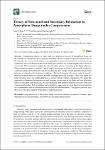Search
Author
- Alessio Zaccone (1)
- Vu D. Lam (1)
Subject
- amorphous drugs (1)
- compression effects (1)
- curcumin (1)
- glass transition (1)
- next >
Date issued
Has File(s)
Search Results
Compression effects on alpha and beta relaxation process of amorphous drugs are theoretically investigated by developing the elastically collective nonlinear Langevin equation theory. We describe the structural relaxation as a coupling between local and nonlocal activated process. Meanwhile, the secondary beta process is mainly governed by the nearest-neighbor interactions of a molecule. This assumption implies the beta relaxation acts as a precursor of the alpha relaxation. When external pressure is applied, a small displacement of a molecule is additionally exerted by a pressure-induced mechanical work in the dynamic free energy, which quantifies interactions between a molecule with its nearest neighbors. The local dynamics has more restriction and it induces stronger effects of c... |
We theoretically investigate high-pressure effects on the atomic dynamics of metallic glasses. The theory predicts compression-induced rejuvenation and the resulting strain hardening that have been recently observed in metallic glasses. Structural relaxation under pressure is mainly governed by local cage dynamics. The external pressure restricts the dynamical constraints and slows down the atomic mobility. In addition, the compression induces a rejuvenated metastable state (local minimum) at a higher energy in the free-energy landscape. Thus, compressed metallic glasses can rejuvenate and the corresponding relaxation is reversible. This behavior leads to strain hardening in mechanical deformation experiments. Theoretical predictions agree well with experiments. |


